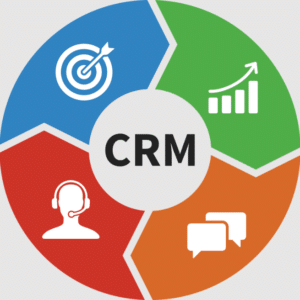Customer Relationship Management (CRM) – In the fast-paced and competitive world of business, small business owners are constantly seeking new strategies to gain a competitive edge and foster growth.
One such powerful tool that has revolutionized the way businesses interact with their customers is Customer Relationship Management (CRM).
CRM is a comprehensive system that enables businesses to manage and analyze their customer interactions, providing valuable insights for decision-making.
In this article, we will explore the surprising benefits of CRM for small business owners and how it can transform their operations.

Organizing Customer Data
The first and foremost advantage of implementing CRM is its ability to organize vast amounts of customer data in a centralized location. In the digital age, businesses accumulate a vast amount of customer information through various channels, such as social media, website interactions, and email communication.
CRM systems streamline this process by storing all customer data in one place, making it easily accessible to authorized personnel.
With CRM, small business owners can create a detailed profile for each customer, including their purchase history, preferences, and communication preferences.
This not only improves customer service by allowing businesses to personalize interactions but also saves time and effort for both the business and the customer.
Enhancing Customer Communication
Effective communication is the cornerstone of any successful business. CRM software offers a range of tools that facilitate personalized and efficient communication with customers.
By segmenting customers based on their preferences and behavior, businesses can deliver targeted marketing messages and promotions, increasing the likelihood of conversion.
Furthermore, CRM enables automated communication processes, such as sending personalized emails on special occasions or transaction confirmations.
This helps in building stronger relationships with customers and enhances their overall experience with the brand.
Streamlining Sales Processes
For small businesses, sales are the lifeblood of growth. CRM plays a vital role in streamlining sales processes and improving the overall efficiency of the sales team. By tracking and managing leads through the CRM system, sales representatives can focus on high-priority prospects and nurture them through the sales funnel.
Moreover, CRM provides valuable insights through sales forecasting and analytics, empowering small business owners to make data-driven decisions. This leads to increased conversion rates and better overall sales performance.
Building Stronger Customer Relationships
Understanding customer needs and preferences is crucial for creating targeted marketing strategies. CRM allows small business owners to gain a deeper understanding of their customers by analyzing their interactions and purchase history.
Armed with this knowledge, businesses can tailor their marketing efforts to meet individual customer preferences, thereby increasing engagement and loyalty.
Additionally, CRM enables the implementation of loyalty programs and personalized offers, encouraging repeat business and customer retention.
Boosting Productivity and Efficiency
As a small business, every minute and resource count. CRM software comes equipped with task automation and reminders, ensuring that important deadlines and follow-ups are never missed. This enhances productivity and allows teams to focus on more strategic tasks.
Moreover, CRM fosters collaboration among different teams within the organization. For instance, the sales team can communicate with the marketing team to align their efforts, resulting in a more cohesive customer experience.
Data-Driven Decision Making
In the business world, data is power. CRM systems provide real-time analytics and reporting, offering valuable insights into customer behavior, market trends, and sales performance.
With these insights, small business owners can identify growth opportunities, make informed decisions, and anticipate challenges.
Data-driven decision making minimizes risks and enables businesses to stay ahead of the competition. It also helps in identifying areas for improvement and optimizing various aspects of the business.
Scalability and Growth
Small business owners aspire to expand their operations and reach new heights. CRM solutions are designed to be flexible and scalable, accommodating the changing needs of a growing business.
As the customer base expands and operations become more complex, CRM can adapt accordingly to support the evolving demands.
Integration with Other Tools
CRM systems seamlessly integrate with various other tools and software that small businesses use. For example, integrating CRM with marketing automation tools allows for targeted marketing campaigns based on customer behavior.
Similarly, integration with e-commerce platforms streamlines order processing and enhances the overall customer experience.
CRM can also be integrated with customer service software, providing a 360-degree view of customer interactions and ensuring a consistent and personalized customer support experience.
CRM Security and Data Privacy
With the increasing emphasis on data privacy and security, CRM systems prioritize the protection of customer information.
Small business owners can implement access controls and data encryption to safeguard sensitive customer data from unauthorized access.
Furthermore, CRM solutions comply with data regulations, ensuring that businesses meet legal requirements and maintain customer trust.
Cost-Effectiveness
Implementing CRM may seem like a significant investment, but its long-term benefits far outweigh the initial costs.
By streamlining processes, enhancing productivity, and optimizing marketing efforts, CRM ultimately leads to cost savings and improved ROI.
CRM providers often offer tailored pricing plans, allowing small business owners to choose a package that aligns with their specific needs and budget.
Overcoming Common Challenges
Implementing CRM in a small business may present certain challenges, such as resistance to change or difficulties in user adoption.
However, by providing adequate training and support to employees, businesses can overcome these hurdles and ensure a successful CRM implementation.
Integration issues with existing systems may also arise, but with proper planning and support from the CRM provider, these challenges can be resolved effectively.
Success Stories of Small Businesses
Numerous small businesses have experienced substantial growth and success after adopting CRM. Case studies and examples highlight the measurable benefits of CRM, ranging from increased customer satisfaction and loyalty to improved sales performance.
These success stories serve as inspiration for other small business owners looking to harness the power of CRM to transform their operations.
The Future of CRM for Small Business Owners
As technology continues to evolve, so does CRM. The future of CRM holds exciting possibilities, with advancements in artificial intelligence and automation.
AI-driven CRM solutions can further enhance customer experiences by predicting customer behavior, offering personalized recommendations, and automating routine tasks.
Small business owners can look forward to more sophisticated and user-friendly CRM systems that provide even deeper insights into customer behavior and market trends.
Conclusion
In conclusion, Customer Relationship Management (CRM) is a game-changer for small business owners, offering a wide range of benefits that boost productivity, enhance customer relationships, and drive growth.
From organizing customer data to facilitating data-driven decision-making, CRM empowers small businesses to thrive in a competitive market.
By adopting CRM, small business owners can streamline their operations, make informed decisions, and deliver exceptional customer experiences. Embracing CRM technology is no longer an option but a necessity for businesses looking to succeed in the digital age.
Read More :
 Pmbmalahayati.id Media Informasi Terupdate Masa Kini
Pmbmalahayati.id Media Informasi Terupdate Masa Kini





